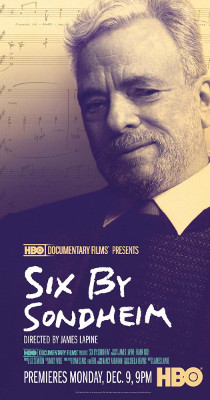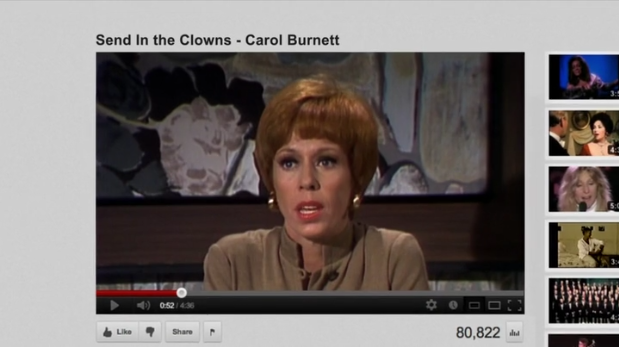Manuel is working his way through all the LGBT-themed HBO productions.
 Last week we looked at the utterly forgettable doc The Out List which mistakes sometimes compelling interviews spliced together as enough of a premise for an entire film. While that film celebrated the visibility of coming out, implicitly praising those who wear their sexuality on their sleeves, presenting them as necessary for political activism, we focus today on a towering figure of the American musical stage whose sexuality is both an acknowledged fact but also rarely a rallying point.
Last week we looked at the utterly forgettable doc The Out List which mistakes sometimes compelling interviews spliced together as enough of a premise for an entire film. While that film celebrated the visibility of coming out, implicitly praising those who wear their sexuality on their sleeves, presenting them as necessary for political activism, we focus today on a towering figure of the American musical stage whose sexuality is both an acknowledged fact but also rarely a rallying point.
You’d never refer to Stephen Sondheim as a “gay songwriter and lyricist” both because in many ways he predates that type of taxonomy but also because he exceeds it. Not that his sexuality hasn’t informed his work. He has, after all, written some of the most complex characters of the American musical theater tradition, all of whom wrestle with their own vexing and at times explicitly transgressive desires.
James Lapine’s Six By Sondheim is structured as a close study of six of the composer’s most famed songs, and only addresses his sexuality when they discuss Company a show that has long felt like a melancholy queer anthem. Perhaps that’s what one reviewer caught when he first saw the show: “As it stands now, it’s for ladies’ matinees, homos and misogynists,” wrote Variety. What emerges in Lapine’s documentary is a celebration of Sondheim — so many interviews with the composer over the years show he’s perhaps the most eloquent commentator of musical theater of the past century — but also a rather touching portrait of an older gay man looking back on his life, his relationship with his mother, and even his failed desire to be a father (“Art is the other way of having children,” he muses).

“Isn’t it rich? Isn’t it queer?”
I love hearing the story of how he wrote “Send in the Clowns” for Glynis Johns. It’s then followed by a spliced version of the song that showcases the many versions recorded since by Barbra Streisand, Cher, Glenn Close, Bernadette Peters, Carol Burnett and others, and then ends with a gorgeous rendition done strictly for the doc by Audra McDonald. That community of performers not coincidentally doubles as a gay pantheon.
After all, he begins the doc talking about how Judy Garland inspired him to write “Something’s Coming” and how Joan Crawford is the inspiration for “I’m Still Here.” Oh, and did I mention Todd Haynes directed the short film that follows which features Jarvis Cocker crooning the famous Follies song?
Six by Sondheim doesn’t set out to be a portrait of a gay composer, but it cannot help but be that. It's a probing examination of a gay artistic sensibility that doesn't wrap itself around rainbows and parades. This is not the identity politics we usually champion and demand of our stars, but it nevertheless shows us a more capacious way of understanding gayness, perhaps as something intrinsic without invoking determinism (no “born this way” rhetoric here), and as something that one both learns and teaches in turn. The doc really just makes you want to drown yourself in Sondheim tunes, which really, make you feel — to borrow one of his lyrics — pretty, and witty, and gay!


Fun Awards Fact: James Lapine was nominated for Outstanding Directing for a Variety Special at the Emmy awards and he was in particular gay company. The other specials nominated in that category? The Kennedy Center Honors (the one with the wonderful Shirley MacLaine number), the NBC smash hit The Sound of Music Live (with queens Audra McDonald and Laura Benanti), the Ellen DeGeneres-hosted Oscars (which bestowed awards on Jared Leto for The Dallas Buyers Club), and eventual winner, the Tony Awards (hosted by Neil Patrick Harris and which crowned Kinky Boots as Best Musical).